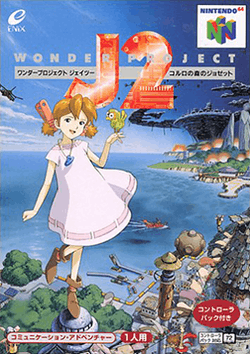Wonder Project J2
| Wonder Project J2: Corlo no Mori no Josette | |
|---|---|
 Japanese Nintendo 64 cover art | |
| Developer(s) | Givro |
| Publisher(s) | Enix |
| Artist(s) | Akihiko Yamashita (character design), Keiichi Sato (mecha design) |
| Composer(s) | Akihiko Mori |
| Platform(s) | Nintendo 64 |
| Release date(s) |
|
| Genre(s) | Life simulation game |
| Mode(s) | Single-player |
Wonder Project J2: Corlo no Mori no Josette (ワンダープロジェクト J2 コルロの森のジョゼット, lit. "Wonder Project J2: Josette of the Corlo Forest") is a Japan-exclusive Bishōjo and raising simulation game developed by Givro and published by Enix (now Square Enix) for the Nintendo 64 in 1996. It is the sequel to Wonder Project J: Kikai no Shōnen Pīno, and was packaged with a game themed Controller Pak.
Story and gameplay
Wonder Project J2 is a sequel to Wonder Project J. The game's protagonist is a girl Gijin (robot), named Josette, invented by the same Doctor Geppetto who built Pino 15 years prior. Having just completed Josette, the aged Doctor Geppetto had little time left to raise her on his own, so the player assists. The previous game's antagonist, Messala, receives orders from the Siliconian King, Siliconian XIII, to "find the girl who lives on the island of Corlo who is in possession of the J," an object of great power capable of giving Gijin humanity and making highly desired dreams come true. Siliconian armies are dispatched to find the girl at Corlo Island. Geppetto tells Josette to leave the island for the island of Blueland where she will meet someone to help her. Blueland is occupied by the Siliconian Army, which is harvesting Proton, a mineral fuel source. The player communicates with Josette through her robot, Bird. The player answers her questions on-screen by selecting "yes" or "no". Josette cannot hear or see the player, but learns about the player through successive, binary questions. She recalls the answers later throughout the story. The player can command Josette through Bird, though she does not always listen. Player advancement through the game is dependent on how well their teachings mesh with other activities on the island. After teaching Josette a series of fundamental human interactions, the game's plot-driven second chapter guides Josette through a series of hardships and confrontation with the Siliconian Army.
Development
Wonder Project J2 was a Japanese-only release, and never intended for any other localization. However, some interest was sparked in North America about the game by a two-page article within Nintendo Power Volume #96 (May 1997) called Epic Center which featured Wonder Project J2 as one of it last publications before it was discontinued due to a lack of role-playing video games on the Nintendo 64.[1] Ten years later in 2007, an English fan translation was undertaken and finished by translator and programmer Ryu, and made public in the form of a patch to be used on a ROM image of Wonder Project J2 for emulation on a Windows PC.
SquareEnixMobile re-released the game for download on mobile phones in Japan on April 12, 2010.
See also
- Small Wonder, a TV show about a young robot girl trying to be more human.
References
- http://www.nintendolife.com/news/2014/03/matters_of_import_wonder_project_j2_brings_masterful_2d_to_the_n64
- http://www.1up.com/features/falls-grace-creative-game-companies